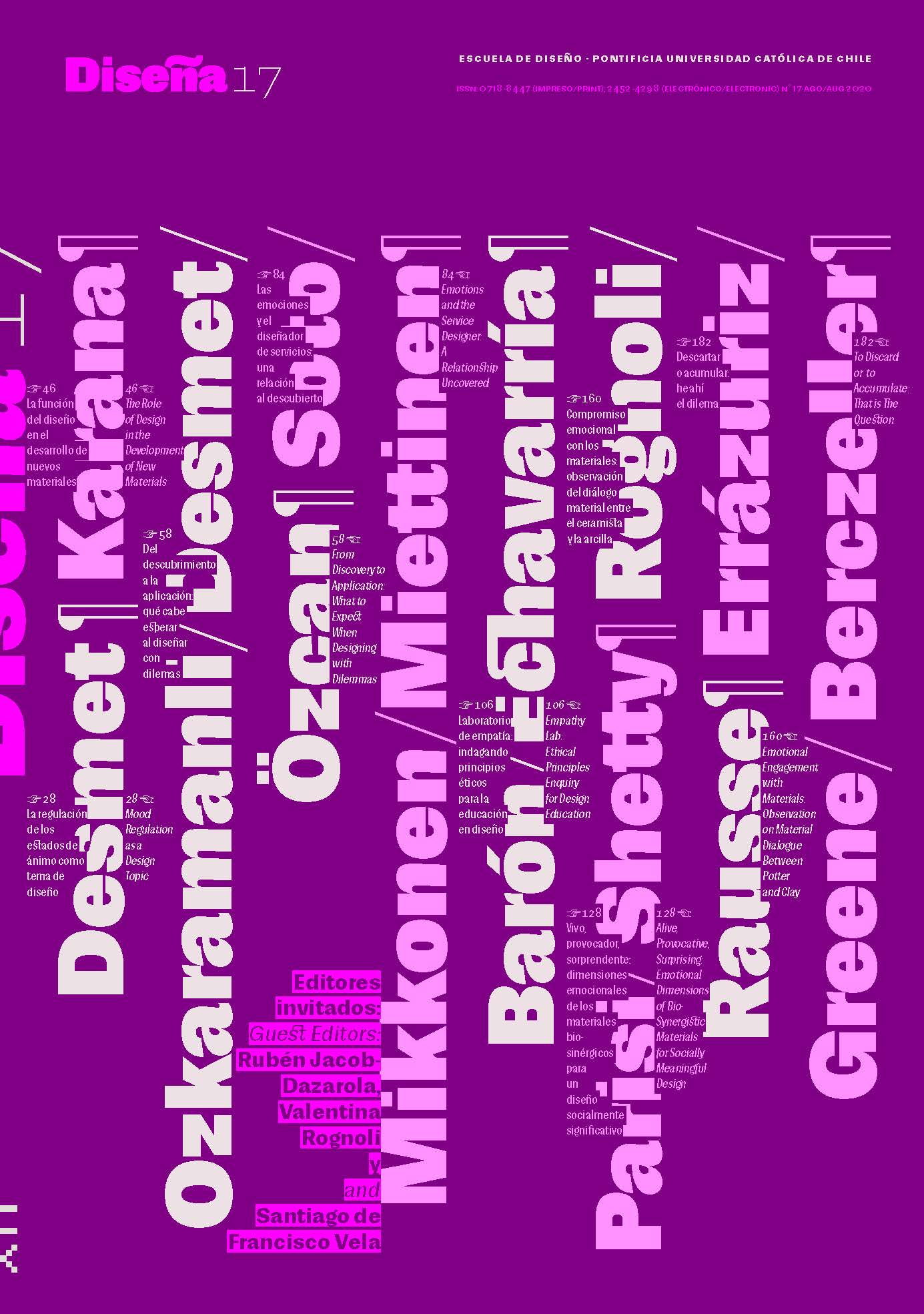Empathy Lab: Ethical Principles Enquiry for Design Education
Main Article Content
Abstract
In this article, we describe the process of creating a toolkit intended to trigger a reflection on the ethical aspects of the design process in students, so that they can develop individual ethics. Following Wildevuur, Van Dijk and Schot, we understand the design process as a practice that requires awareness and openness, through exchanges that combine expectations and emotional ties that support identity, independence, and mutual recognition. Consequently, the toolkit proposes to face different academic challenges whose common aim is to include empathy in the different stages of a design project. Building from the iteration of the toolkit, we propose three new principles for the inclusion of ethics in the design process: admiration, commitment, and integrity. These principles expand the three concepts raised by IDEO ‒ respect, responsibility, and honesty, addressing a more emotional dimension of each.
Downloads
Article Details

This work is licensed under a Creative Commons Attribution-ShareAlike 4.0 International license.
COPYRIGHT NOTICE
All contents of this electronic edition are distributed under the Creative Commons license of "Attribution-ShareAlike 4.0 Internacional" (CC-BY-SA). Any total or partial reproduction of the material must mention its origin.
The rights of the published images belong to their authors, who grant to Diseña the license for its use. The management of the permits and the authorization of the publication of the images (or of any material) that contains copyright and its consequent rights of reproduction in this publication is the sole responsibility of the authors of the articles.
References
BAMBERGER, M. (2012). Methodological Issues to Design and Implement Equity-focused Evaluations. In M. Segone (Ed.), Evaluation for Equitable Development Results (pp. 86–101). UNICEF.
BARÓN ARISTIZABAL, M. P., & ECHAVARRÍA QUINCHIA, M. (2019). De uno a todos: Preguntas para construir un proceso de diseño basado en la empatía. Uniandes.
BURTON, B., HENRY, M., MCCOLGIN, D., & SPINAT, D. (2013). Designing for Empathy: A Toolkit Created by Artefact. Artefact.
DESMET, P. M. A., & POHLMEYER, A. E. (2013). Positive Design: An Introduction to Design for Subjective Well-Being. International Journal of Design, 7(3), 5–19.
FINDELI, A. (2001). Rethinking Design Education for the 21st Century: Theoretical, Methodological, and Ethical Discussion. Design Issues, 17(1), 5–17. https://doi.org/10.1162/07479360152103796
GREENE, J. C., BOYCE, A., & AHN, J. (2011). A Values-Engaged, Educative Approach for Evaluating Education Programs: A Guidebook for Practice. University of Illinois. https://comm.eval.org/HigherLogic/System/DownloadDocumentFile.ashx?DocumentFileKey=75bc9c3b-b169-4529-b2d3-642056d95f35&forceDialog=0
KELLEY, D., SURI, J. F., & IDEO. (2016). The Little Book of Design Research Ethics. IDEO.
MEADOWS, D. H. (2008). Thinking in Systems: A Primer. Chelsea Green Publishing.
MERRIAM, S. B., & TISDELL, E. J. (2015). Qualitative Research: A Guide to Design and Implementation. John Wiley & Sons.
MONTEIRO, M. (2019). Ruined by Design: How Designers Destroyed the World, and What We Can Do to Fix It. Mule Books.
NUSSBAUM, M. C. (2005). El cultivo de la humanidad: Una defensa clásica de la reforma en la educación liberal. Paidós.
OLIVER-HOYO, M. T., & ALLEN, D. (2006). The Use of Triangulation Methods in Qualitative Educational Research. 35(4), 42–47.
PAPANEK, V. (2012). Design for the Real World: Human Ecology and Social Change. Thames and Hudson.
SIMON, H. A. (2019). The Sciences of the Artificial. MIT Press.
WILDEVUUR, S. E., VAN DIJK, D., & SCHOT, M. (2014). Enhancing the Value of Social Innovation: Introducing the ‘People Value Canvas’ to Support Designers in Value Creation. In J. Salamanca, P. M. A. Desmet, A. Burbano, G. D. S. Ludden, & J. Maya (Eds.), The Colors of Care: Design & Emotion 2014, 9th International Conference, Colombia (pp. 301–307). Uniandes.

